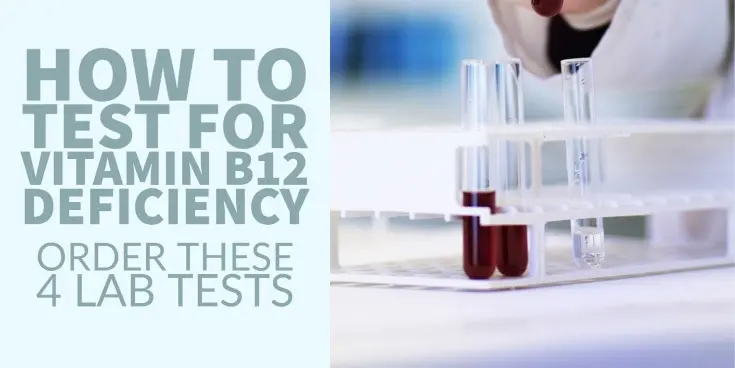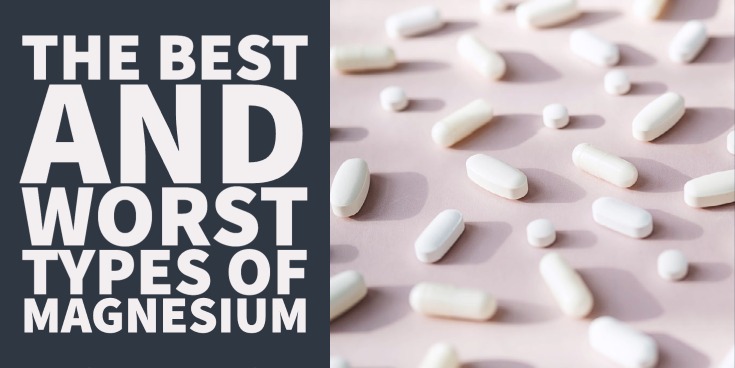Vitamin B12 might be one of the most important vitamins in the body because every single cell in your body needs it.
And if you are deficient in this important vitamin you may start to experience problems in energy production, nerve cell growth, and other areas.
Low vitamin B12 levels may cause fatigue, nerve problems, hair loss, weight gain, heart problems, and more.
Because your Vitamin b12 levels are so important we are going to spend some time talking about how to test for a deficiency in this important marker.
The good news is that testing is actually not that difficult.
The bad news is that most doctors order the wrong tests or simply don’t know how to interpret them correctly…
4 Tests to Check for Vitamin B12 Deficiency
So what are you supposed to do if you think that you have a problem with low vitamin B12 levels?
Well, the first step is to TEST!
Testing for vitamin B12 will not only tell you if there is enough B12 in your bloodstream but it will also help you to know if your body is actually using that B12 (but only if you order the right tests).
And while you may think it’s as easy as just checking your serum B12 levels, you’d be wrong and you would miss out on 3 other important tests!
If you want to accurately diagnose vitamin B12 deficiency then THESE are the tests that you need to get:
#1. Serum B12 Level
The first test you should be aware of is known as the serum B12 level.
The serum is just a fancy way of describing what is in your bloodstream.
So serum B12 refers to the amount of B12 that is floating around in your bloodstream and in your body.
But there’s one big problem…
Just because this B12 is floating around in your bloodstream does NOT mean that your body is actually using it.
And this is a concept I want to make sure you understand.
Just because something is in your blood does not mean that your body can use it.
In fact, in the case of B12, it’s often the case that even though serum B12 levels are “normal” the body isn’t actually able to utilize the B12 floating around because it’s in the wrong form or because of genetic mutations.
And doctors know this!
This is first-year medical school-type information (1) that all doctors should be taught and it’s why the next test exists (MMA).
We will talk more about MMA in a second but I want you to understand here that if your doctor insists upon ordering and only looking at your serum B12 level then you know that he/she does not truly understand how B12 works in the body.
In a similar vein, if your doctor suggests that you are taking too much vitamin B12 because your serum B12 is too high then you know that they definitely don’t know what they are talking about.
Even though your serum B12 level may increase while you supplement with B12 it does NOT mean that your body is actually using it.
Low-quality B12 supplements like cyanocobalamin will register in your bloodstream but they may not be activated or methylated due to MTHFR genetic mutations. (2)
#2. MMA (Methylmalonic acid)
The next test that you can order is known as methylmalonic acid or MMA for short.
What is methylmalonic acid and what does it have to do with vitamin B12 deficiency?
Without getting into the weeds, vitamin B12 is required as a cofactor for certain enzymatic pathways in the body.
If your vitamin B12 levels fall to a certain point then your body will have a hard time running these pathways at an optimal rate.
So as B12 levels fall it slows down the metabolism of these pathways which results in a build-up of methylmalonic acid.
And methylmalonic acid is a MUCH better marker of vitamin B12 deficiency because it actually tells you if your body can utilize the B12 floating around in your bloodstream.
Doctors know this, or at least they should because they were taught this in their first year of medical school.
This is why I recommend that you run away from doctors who are dead set on using the serum B12 level to diagnose vitamin B12 deficiency.
But back to the MMA test for a second.
Even though checking your methylmalonic acid level is a much more accurate way to test for vitamin B12 deficiency it still has its cons.
The biggest is the cost of the test.
It’s actually more expensive to get your blood drawn and tested for MMA than it is to simply buy a vitamin B12 supplement and take it.
Because of this, it’s often recommended to simply skip the test and just go straight to supplementing if you have the clinical symptoms of vitamin B12 deficiency.
I’m not a huge fan of the MMA test and rarely ordered it for my patients for that very reason.
But, if you really want to accurately measure B12 metabolism in your body then the MMA test is the way to go.
#3. MCV (Mean Corpuscular volume)
The next two tests that we are going to talk about are not specific to vitamin B12 deficiency but they can be used to help paint a broad picture of your overall health and to give you information about vitamin B12 metabolism.
The first test that you will most likely have in your possession, even as you read this, is known as the MCV.
MCV is a part of the complete blood count or CBC.
The CBC is the test that your doctor orders to check your red blood cells, and white blood cells and checks to make sure you are not anemic.
It’s incredibly cheap and it’s ordered as part of your yearly checkup so there is a very high chance that you have this test result on hand.
The MCV stands for mean corpuscular volume and it gives you information about the size of your red blood cells.
What you need to know is that as your vitamin B12 levels fall it triggers a change in the size of your red blood cells such that they start to grow bigger (3).
And bigger is NOT better, at least not in this case.
You want your red blood cells to be a nice even and regular size in order to facilitate the carrying of oxygen to your tissues.
As they grow bigger they start to lose some of this functionality which can cause serious problems.
An MCV greater than 90 or 92 can be used as an early marker of vitamin B12 deficiency.
And because this test is so cheap, and because very few things influence the MCV, it’s a good idea to take a look at this value if you think you might have a B12 deficiency.
#4. Homocysteine level
The next test worth considering is known as the homocysteine level.
Much like the MCV, homocysteine can give you information about whether or not vitamin B12 is being used in the body.
Here’s why:
Homocysteine can be broken down and metabolized into another protein known as cysteine.
But in order for this process to occur your body needs vitamin B12 to make the reaction function optimally.
So if your vitamin B12 level is low then you will see a build-up of homocysteine because it cannot be broken down.
Therefore, a high homocysteine level may be an early indicator of vitamin B12 deficiency (4).
It can also be a warning sign that your body cannot metabolize vitamin B12 even if your serum B12 level is “normal”.
Homocysteine is not often ordered but having a high homocysteine level can increase your risk of heart disease so it’s a very good idea to check where you are at the next time you get your blood drawn.
By using both homocysteine and the MCV you can really get a good idea if your body is able to metabolize and use vitamin B12.
The Case for Supplementing Without Testing
Let’s talk about one more final and very important point…
Is it even necessary to test for B12 deficiency before supplementing?
If you ask me, I don’t think it’s 100% necessary to go through all of these tests BEFORE you supplement with Vitamin B12.
Why?
Well, first of all, the tests themselves cost more money than purchasing a pre-methylated B vitamin.
And secondly, there’s no single test that is 100% accurate in diagnosing the condition.
No matter how thorough you are, laboratory testing is simply not always accurate.
It’s the best thing that we have, but each test has its pros and cons.
And even if all tests show that you are “good”, it’s still possible that supplementing is still the right choice.
When you factor in the harmless side effect profile of Vitamin B12 supplements, it makes it a no-brainer.
Having said that, I still would recommend getting the lab tests listed above (with the exception of MMA) if it is convenient, cheap, and not a big hassle.
The information provided by these tests, while not necessarily 100% accurate, can still provide you with a story about your overall health.
For instance, these lab tests, when combined with others, may paint a picture of multiple nutrient deficiencies, a problem with your diet, and so on.
So while the information may not be necessary for supplementing with B12 by itself, it may still be useful when evaluating your health as a whole.
Final Thoughts
Do you suspect that you have a problem with vitamin B12 levels?
Do you have any of the symptoms of vitamin B12 deficiency?
Have you had any of the 4 tests listed above checked?
If so, leave your questions or comments below!
Scientific References
#1. https://pubmed.ncbi.nlm.nih.gov/30795564/
#2. https://www.cdc.gov/ncbddd/folicacid/mthfr-gene-and-folic-acid.html
#3. https://pubmed.ncbi.nlm.nih.gov/23447660/
#4. https://pubmed.ncbi.nlm.nih.gov/11553056/









